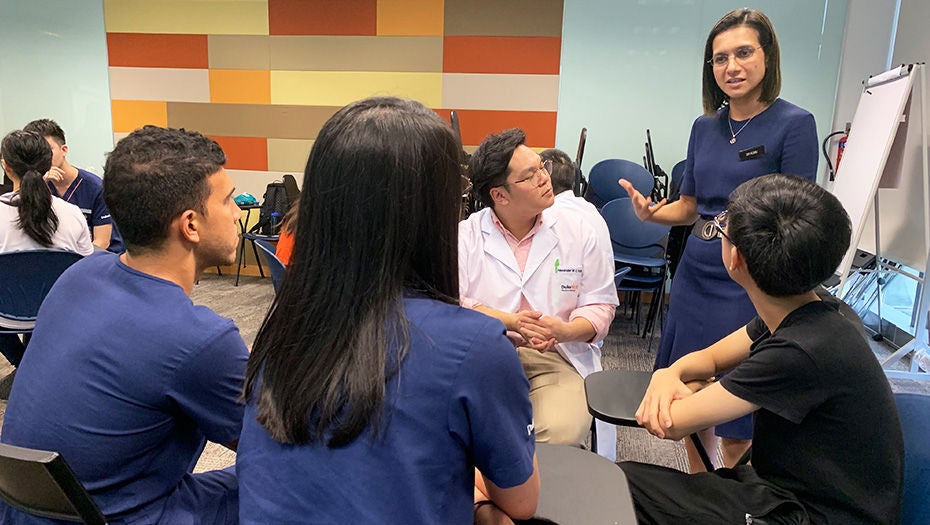
Dr Kumudhini (right, standing) advising during a workshop where medical students practise communicating with adolescent patients, with help from a teenage actor (right, in black).
Teenage actors playing the role of adolescent patients are helping medical students learn how to broach sensitive topics with teens during consultations
When teenagers consult doctors, they may have questions that require discussion with doctors but may not know how to broach these often sensitive topics. It then becomes the doctors’ responsibility to provide their teenage patients with opportunities to discuss these issues openly.
One strategy that doctors treating adolescents adopt is to negotiate some consultation time without parents, as often adolescents can be reluctant to open up if they have a parent in the room.
And opening up is crucial for the doctor to get accurate information, make the correct diagnosis, provide appropriate anticipatory guidance, and offer the most effective treatment.
An example of this is when a teen is seeing the doctor for worsening asthma because of smoking. His parents may not know about the smoking, but a doctor, who can ask the right questions, may be able to uncover the vital information which will impact the diagnosis and treatment.
However, many freshly-minted doctors find broaching sensitive topics with teenagers, a challenge. Some of these topics include biopsychosocial changes at puberty, sexual and mental health, underage smoking, alcohol use, academic stress and cyber-bullying.
Teen actors can help
Since August 2016, doctors from KK Women’s and Children’s Hospital (KKH) have been running an adolescent simulated patient programme, where medical students can practise doctor-patient conversations with teenage actors specifically trained to play the role of patients.
Aged 16 to 18, these teenage actors are trained in a specific patient scenario by KKH doctors, so that they can role play realistic conversations with the medical students.
The actors from Buds Theatre - a nonprofit group that gives theatre graduates a platform to practise acting - are also encouraged and trained to give constructive feedback.
“The benefit of this feedback is that the medical students get responses from an adolescent perspective, not an adult perspective,” said Dr Kumudhini Rajasegaran, Head and Senior Consultant, Adolescent Medicine Service, Department of Paediatrics, KKH, who introduced the programme after facilitating a similar one while on fellowship in Australia.
So far about 200 medical students from Duke-NUS Medical School and Lee Kong Chian School of Medicine have attended this three-hour workshop which is held during their paediatric rotation.
Dr Kumudhini said research had shown that physicians and trainees find they are inadequately trained to speak to adolescents about sensitive subjects, and are keen to have further training. Medical students here have been traditionally trained in these topics in the form of a lecture.
“Everyone finds it difficult asking sensitive questions, including doctors. For a medical student, practising this in a safe environment helps them understand the difference between theory and reality. They come out of the workshop more confident and equipped with tools to open up a conversation, which they may not have had, or were fearful to do so previously.”
What they have learnt
Among the tools they acquire is learning how to gently approach a sensitive topic, how to prepare and ease patients into it, and how to make adolescents feel safe opening up.
Post workshop surveys show promising results. The students report that they are more confident conducting biopsychosocial assessments and managing difficult communications.
Second year Duke-NUS Medical Student, Cheryl Woo Ting Zhen, said, “It’s impossible to have such a sensitive conversation without fumbling for the first time. We were fortunate to practise it in a safe environment where we could get feedback, enhance our skills to talk about sensitive issues, and build rapport.”
Dr Kumudhini thinks it would be good to have more healthcare staff learn these skills. “This is a small pilot project. We would like to expand this to include more healthcare professionals but will need more resources.”













 Get it on Google Play
Get it on Google Play